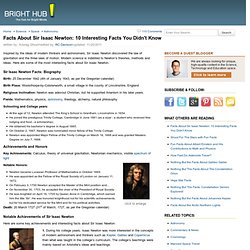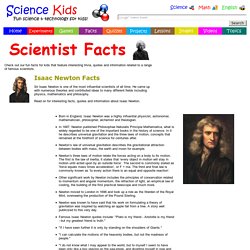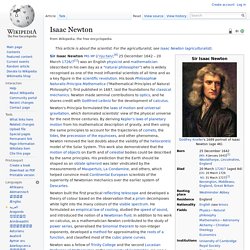

Sir Isaac Newton Facts: 10 Interesting Facts About the Discoverer of the Three Laws of Motion, Calculus, and Astronomy. Notable Achievements of Sir Isaac Newton Here are some key achievements and interesting facts about Sir Isaac Newton: 1.

During his college years, Isaac Newton was more interested in the concepts of modern astronomers and thinkers such as Kepler, Galileo and Copernicus than what was taught in the college’s curriculum, The college’s teachings were mainly based on Aristotle’s ideas and teachings. 2. Sir Isaac Newton developed the generalized binomial theorem in 1665. 3. Newton published few accounts of the calculus in 1693 and the full portion in 1704, whereas Leibniz published his complete papers in 1684. 4. 5. 6. 7.
Fun Facts About Isaac Newton. Isaac Newton Facts, Quotes, Gravity, Laws of Motion, Universal Gravitation. Born in England, Isaac Newton was a highly influential physicist, astronomer, mathematician, philosopher, alchemist and theologian.

In 1687, Newton published Philosophae Naturalis Principia Mathematica, what is widely regarded to be one of the important books in the history of science. In it he describes universal gravitation and the three laws of motion, concepts that remained at the forefront of science for centuries after. Newton’s law of universal gravitation describes the gravitational attraction between bodies with mass, the earth and moon for example. Newton’s three laws of motion relate the forces acting on a body to its motion. The first is the law of inertia, it states that ‘every object in motion will stay in motion until acted upon by an outside force’.
Sir Isaac Newton. Isaac Newton. Isaac Newton. Sir Isaac Newton PRS MP (/ˈnjuːtən/;[8] 25 December 1642 – 20 March 1726/7[1]) was an English physicist and mathematician (described in his own day as a "natural philosopher") who is widely recognised as one of the most influential scientists of all time and as a key figure in the scientific revolution.

His book Philosophiæ Naturalis Principia Mathematica ("Mathematical Principles of Natural Philosophy"), first published in 1687, laid the foundations for classical mechanics. Newton made seminal contributions to optics, and he shares credit with Gottfried Leibniz for the development of calculus. Newton built the first practical reflecting telescope and developed a theory of colour based on the observation that a prism decomposes white light into the many colours of the visible spectrum. He formulated an empirical law of cooling, studied the speed of sound, and introduced the notion of a Newtonian fluid. Life Early life Isaac Newton (Bolton, Sarah K. Middle years Mathematics Optics. Ten Strange Facts About Newton. Sir Isaac Newton (1642-1727) was the greatest scientist that ever lived.

More than any other person, Newton was single-handedly responsible for laying the the groundwork in classical mechanics, optics, and even mathematics. Landing man on the moon? Don't look at Einstein - it was all done with Newtonian physics. Even though every high school student that has ever taken physics (should) remember Newton's contributions, not many know about the man behind the science. For example, did you know that Sir Isaac was an alchemist?
Read on for more obscure facts about the life of Isaac Newton, the world's greatest scientist: 1. In 1642, the year that Galileo Galilei died, Isaac Newton was born prematurely on Christmas Day*. *There is controversy about this date, some said that he was born on January 4, 1643. 2. Newton was born into a farming family. 3. The story (popularized by Voltaire, no less!) Whatever happened to the tree? 4. Newton's secretiveness had led to many quarrels over credit. 5.